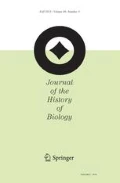Abstract
Much writing on scientific biography focuses on the legitimacy and utility of this genre. In contrast, this essay discusses a variety of genre conventions and imperatives which continue to exert a powerful influence on the selection of biographical subjects, and to control the plot and structure of the ensuing biographies. These imperatives include the following: the plot templates of the Bildungsroman (the realistic novel of individual self-development), the life trajectories of Weberian ideal types, and the functional elements and personae of the folkloric tale of the “hero’s quest.” The essay discusses the nature and application of these genre conventions in some detail, with the conclusion that biography, however useful, exerts a powerfully distorting influence on the image of how most science gets done.
Similar content being viewed by others
References
Bell E. T. Men of Mathematics. New York: Simon and Schuster, 1937
Biagioli Mario. The Instability of Authorship. Credit and Responsibility in Contemporary Biomedicine. In Philip Mirowaski, Esther-Mirjam Sent (eds) Science Bought and Sold. Essays in the Economics of Science. Chicago: University of Chicago Press, 2002. pp. 486–514
Browne Janet. 2002. Charles Darwin. The Power of Place. Vol. II of a Biography. New York: Alfred A. Knopf
Brush, Stephen G. 1974. “Should the History of Science Be Rated X.?” Science 183(4130): 1164–1172
Craig Gordon Alexander. Germany, 1866–1945. Oxford: Clarendon Press, 1978
Desmond Adrian, James Moore. Darwin. The Life of a Tormented Evolutionist. New York: W.W. Norton & Company, 1991
Dijksterhuis, E. J. 1961. The Mechanization of the World Picture. Translated by C. Dikshoorn. Oxford: Clarendon Press
Gillispie Charles Coulston (ed.) Dictionary of Scientific Biography. Vol. 1. New York: Charles Scribner’s Sons, 1970
Hankins, Thomas. 1979. “In Defense of Biography: The Use of Biography in the History of Science.” History of Science xvii: 1–16
Hekman Susan J. Weber, the Ideal Type, and Contemporary Social Theory. Notre Dame, Indiana: University of Notre Dame Press, 1983
Iltis, Hugo. 1966. Life of Mendel. Translated by Eden and Cedar Paul. English ed. New York: Hafner Publishing Company (1924)
Jameson Fredric. The Political Unconscious: Narrative as a Socially Symbolic Act. Ithaca, N.Y.: Cornell University Press 1982
Jungnickel Christa, Russell McCormmach. The Intellectual Mastery of Nature: Theoretical Physics from Ohm to Einstein. 2 vols. Chicago: University of Chicago press, 1986
Landau, Misia. 1984. “Human Evolution as Narrative.” American Scientist 72: 262–268
Landau Misia. Narratives of Human Evolution. New Haven: Yale University Press, 1991
Lévi-Strauss Claude. La Pensée Sauvage. Paris: Plon, 1962
Lewontin Richard. (2001) Darwin, Mendel, and the Mind. In Richard Lewontin (ed) It Ain’t Necessarily So. The Dream of the Human Genome and Other Illusions. New York: New York Review Books, pp. 75–108
McCormmach Russell. Night Thoughts of a Classical Physicist. Cambridge, MA: Harvard University Press, 1982
Nettl J.P. Rosa Luxemburg. 2 vols. New York: Oxford University Press, 1966
Nye, Mary Jo. 2006. “Scientific Biography: History of Science by Another Means?” Isis 97: 322–329
Orel Vitezslav. Gregor Mendel: The First Geneticist. New York: Oxford University Press, 1996
Porter, Theodore M. 2006. “Is the Life of a Scientist a Scientific Unit?” Isis 97: 314–321
Propp, V(ladimir).1968. Morphology of the Folktale. Translated by Laurence Scott, revised and edited by Louis A. Wagner. 2nd ed. Vol. 9, Publications of the American Folklore Society, Inc. Bibliography and Special Series. Austin: University of Texas Press (Russian Original 1928)
Sayre Anne. Rosalind Franklin and DNA. New York: Norton, 1975
Shipman Pat. The Man Who Found the Missing Link: Eugene Dubois and His Lifelong Quest to Prove Darwin Right. New York: Simon & Schuster, 2001
Stoczkowski, Wictor. 2002. Explaining Human Origins. Myth, Imagination and Conjecture. Translated by Mary Turton. Cambridge: Cambridge University Press (Original French, 1994)
Terrall, Mary. 2006. “Biography as Cultural History of Science.” Isis: 306–313
Veyne, Paul. 1984. Writing History. Essay on Epistemology. Translated by Mina Moore-Rinvolucri. Middletown, CN: Wesleyan University Press (French Original 1971)
Wassersug, Richard J., and Michael R. Rose. 1984. “A Reader’s Guide and Retrospective to the 1982 Darwin Centennial.” The Quarterly Review of Biology 59: 417–437
Watson, James D. 1968. The Double Helix; a Personal Account of the Discovery of the Structure of DNA. New York Atheneum
Author information
Authors and Affiliations
Corresponding author
Rights and permissions
About this article
Cite this article
Greene, M.T. Writing Scientific Biography. J Hist Biol 40, 727–759 (2007). https://doi.org/10.1007/s10739-007-9124-x
Published:
Issue Date:
DOI: https://doi.org/10.1007/s10739-007-9124-x




